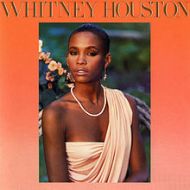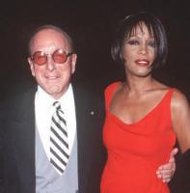 Kort na haar overlijden verscheen op de Amerikaanse website Stop The Presses! van Dave DiMartino een artikel met de intrigerende titel Whitney Houston: How Good Was She?. Hij doet daarin een poging haar megastatus te doorgronden. Ik geef het hier integraal weer, en als ik tijd en zin heb (wat waarschijnlijk niet zal gebeuren) ga ik het tzt nog eens vertalen.
Kort na haar overlijden verscheen op de Amerikaanse website Stop The Presses! van Dave DiMartino een artikel met de intrigerende titel Whitney Houston: How Good Was She?. Hij doet daarin een poging haar megastatus te doorgronden. Ik geef het hier integraal weer, en als ik tijd en zin heb (wat waarschijnlijk niet zal gebeuren) ga ik het tzt nog eens vertalen.
” Whitney Houston’s unexpected departure from this Earth, and the deafening stream of praise from nearly all quarters of the globe–from fans, fellow musicians, the star-studded attendees of Clive Davis’s Grammy Party, held Saturday night in the same hotel in which she died hours earlier–left no doubt. She was deeply loved, and will be deeply missed.
And her career résumé, cut and pasted to nearly every well-meaning obituary because of its vast and impressive bulk, was, without question, eye-opening. And, to be fair, unprecedented.
It was no wonder, then, that Sunday night’s Grammy Awards program seemed less a celebration of the ongoing and still burgeoning career of British singer Adele than a long and sentimental tribute to the suddenly dead, suddenly gone, troubled singer Houston–who years earlier seemed the music industry’s very brightest hope.
Still, the question remains: Despite the accolades, the massive record sales, the radio hits, the video hits, the movie hits–exactly how good was Whitney Houston?
It’s not a small question, and not an easy one to answer.
 If “good” is defined as a function of overall record sales and public recognition, who on Earth can argue? According to the often-inaccurate-but-not-too-bad-in-terms-of-the-big-picture Wikipedia, Houston was a staggering record-breaker: Guinness World Records apparently lists her as “the most awarded female act of all time,” among her credits are two Emmy awards, six Grammy awards, 30 Billboard Music awards, and 22 American Music awards, part of what is said to be a “total of 425 career awards as of 2010.” Clearly, “Friday” will be only the beginning of new contender Rebecca Black’s quest to attain similar heights.
If “good” is defined as a function of overall record sales and public recognition, who on Earth can argue? According to the often-inaccurate-but-not-too-bad-in-terms-of-the-big-picture Wikipedia, Houston was a staggering record-breaker: Guinness World Records apparently lists her as “the most awarded female act of all time,” among her credits are two Emmy awards, six Grammy awards, 30 Billboard Music awards, and 22 American Music awards, part of what is said to be a “total of 425 career awards as of 2010.” Clearly, “Friday” will be only the beginning of new contender Rebecca Black’s quest to attain similar heights.
No less importantly, Houston set a freakish amount of Billboardchart records during the run she enjoyed since her 1985 debut album Whitney Houston. Most of them have been dutifully listed in the obituaries that have appeared since her passing; suffice to say that she is credited with selling “over 170 million albums, singles and videos worldwide,” and that doesn’t begin to touch what’s been shared via downloads, the original Napster, and those peculiar regions of the world where cloned CD-Rs cost less than a dollar because publishing royalties aren’t exactly a major priority.
And in fact, the two paragraphs above are the major problem.
Whitney Houston’s rise to prominence directly coincided with some of the very same aspects of the music industry that, in 2012, is close to bringing it to its knees. If one is willing to accept that she was immensely talented and had an absolutely marvelous voice, which this writer does, one must also consider the following industry trends, most of which directly coincide with Houston’s rise to fame:
1) Houston was the recipient of enormous record company publicity: In this writer’s possession is at least one Whitney Houston calendar (I could swear I’ve got two, somewhere, but this came later), part of a promotional boxed set her label Arista offered up in 1987 to promote her upcoming albumWhitney. Titled Portfolio, the set included an album, a calendar, postcards, a songbook, and, if you were me at the time, a personal note from the label publicist implying that the singer was of the highest internal priority. She also was quite an attractive model in earlier days.
2) Houston’s material often seemed random, the work of a committee first and foremost looking for radio hits:Houston’s rise to fame directly coincided with the conspicuous “rebirth” of professional songwriters who penned hits for a living and never really entered the performing sphere–people like Michael Masser, who co-penned her early hits like “Greatest Love Of All” and “Saving All My Love For You,” the later in fact with Gerry Goffin, who did the same trick years earlier with former co-writer (and former spouse and later performer) Carole King. Nothing wrong with this–in the end, the song always wins–but historically at odds with the singer-songwriter figures that had previously been the late-’60s tradition.
 3) Houston’s résumé would later become her defining point: Upon her massive success, the singer’s label boss Clive Davis would often refer to her less as an artist than as a stunning sales record-setter. Though lip-service would be paid, her real art (with his help, though that was politely unspoken) came via her ability to–with the proper selection of song and the proper selection of producer–construct a virtually “perfect” song that would swiftly rise to the top of the charts, gain airplay in as many formats as possible, and offend nobody. Whitney Houston’s songs did not define her; she was a near-perfect human “instrument” that, like the best keyboards of the day, would not go out of tune or detract from the overall package: A finely selected and produced song guaranteed to offend as few people as possible.
3) Houston’s résumé would later become her defining point: Upon her massive success, the singer’s label boss Clive Davis would often refer to her less as an artist than as a stunning sales record-setter. Though lip-service would be paid, her real art (with his help, though that was politely unspoken) came via her ability to–with the proper selection of song and the proper selection of producer–construct a virtually “perfect” song that would swiftly rise to the top of the charts, gain airplay in as many formats as possible, and offend nobody. Whitney Houston’s songs did not define her; she was a near-perfect human “instrument” that, like the best keyboards of the day, would not go out of tune or detract from the overall package: A finely selected and produced song guaranteed to offend as few people as possible.
4) Houston’s career “branched out“: Few would contend that the singer’s appearance in The Bodyguard, which brought her praise and staggering record sales thanks to her cover of Dolly Parton’s “I Will Always Love You,” was a less than astute move, but still it signaled a departure from her pure musical focus to…other, broader areas. During the ’90s, the other areas would include movies such as Waiting To Exhale and The Preacher’s Wife–which, whether perceived as marketing vehicles for their accompanying soundtrack albums, or vice-versa, removed her from her status as a “pure” musician and jettisoned her into that scary realm of “pop culture figures.” The culmination came via 2005′s horrendous “Being Bobby Brown” Bravo TV series, which offered the public much more than they ever wanted to see about their mythical pop goddess and her questionable taste in men and appropriate onscreen behavior. In short: Whitney Houston was an early pioneer in displaying exactly why reality TV was despicable in theory and in actual execution. A literal career-killer.
 5) Live by the sword, die by the sword: Absolutely no one would dispute that Ms. Aretha Franklin–coincidentally Whitney Houston’s godmother–is, and has always been, the true Queen Of Soul. Her work has largely been impeccable. And yet with very few exceptions–perhaps relevantly during her protracted stint at Clive Davis’s Arista Records–she has rarely been viewed as an artist in search of a hit, an artist whose reputation was purely a function of her ability to set sales records or reach the top of the charts. She remains a legend. Houston, whose power ultimately was projected as a function of her sales ability, always suffered in comparison. Franklin’s stunning ability to pull notes out of nowhere and send shivers up your spine–typified in the ’60s via hits like “Respect”–might have been equaled by Houston in terms of raw ability, but on the basis of the latter’s many albums, and the committee at her label that saw fit to ultimately release them, one gets the impression that she was encouraged not to go too “out there” for fear of upsetting the general public. As a result, when we praise Aretha Franklin, we now speak in terms of her raw ability; when we praise Whitney Houston, we speak in terms of her record sales. And a lot of people who buy records are stupid. And rarely play them more than a few times.
5) Live by the sword, die by the sword: Absolutely no one would dispute that Ms. Aretha Franklin–coincidentally Whitney Houston’s godmother–is, and has always been, the true Queen Of Soul. Her work has largely been impeccable. And yet with very few exceptions–perhaps relevantly during her protracted stint at Clive Davis’s Arista Records–she has rarely been viewed as an artist in search of a hit, an artist whose reputation was purely a function of her ability to set sales records or reach the top of the charts. She remains a legend. Houston, whose power ultimately was projected as a function of her sales ability, always suffered in comparison. Franklin’s stunning ability to pull notes out of nowhere and send shivers up your spine–typified in the ’60s via hits like “Respect”–might have been equaled by Houston in terms of raw ability, but on the basis of the latter’s many albums, and the committee at her label that saw fit to ultimately release them, one gets the impression that she was encouraged not to go too “out there” for fear of upsetting the general public. As a result, when we praise Aretha Franklin, we now speak in terms of her raw ability; when we praise Whitney Houston, we speak in terms of her record sales. And a lot of people who buy records are stupid. And rarely play them more than a few times.
6) Whitney Houston caused “American Idol”: Once, absolutely no one in their right mind had any idea what the term “melisma” meant–hint, according to our good buddies at Wikipedia, it’s “the singing of a single syllable of text while between moving between several different notes in succession”–but rest assured that between Whitney and her conspicuously inferior successor Mariah Carey, most of America now assumes being a “good singer” involves acrobatic vocal skills that express little other than genetic ability and virtually zilch in terms of emotion, soulfulness, or ability to connect with fellow humans. It’s why most contestants on “American Idol”and other similar reality music shows are embarrassing and painful to watch, let alone listen to. To be blunt: They suck, and Whitney’s pretty much to blame.
Remove the very concept of record sales and “cultural phenomenon” from the career path of Whitney Houston, and you’ve got an artist who perhaps enjoyed a few years of a positive critical reception before her work was regarded as the bland output of an artist who was subservient to a label that insisted her work offend as few people as possible while simultaneously mildly please many, many more.
Though she’s now regarded as a superstar whose work by definition was geared toward the masses, Houston, in her very earliest work, offered a tantalizing glimpse of a very capable singer who–were her life choices different–might have ended up in another place entirely.
Hours after her death, various clips of one of her first vocal performances surfaced, and to those unfamiliar, it’s moving indeed.
In 1982, when she was only 19, the singer appeared on a marvelous recording by the band Material, whose album One Down–released on Elektra Records in 1982–also featured legendary jazz saxophonist Archie Shepp, who appears with Houston on this moving version of “Memories,” penned by British band Soft Machine more than a decade earlier. It’s a beautiful, moving version of the song–and for one of very few times in her career, indeed, before she’d actually signed her first record deal–it displays the singer in all her glory, pursuing art rather than hit-making, of reaching the greatest audience possible. Its message, even more ironically, has even greater relevance today. Give it a listen.”

Recent Comments